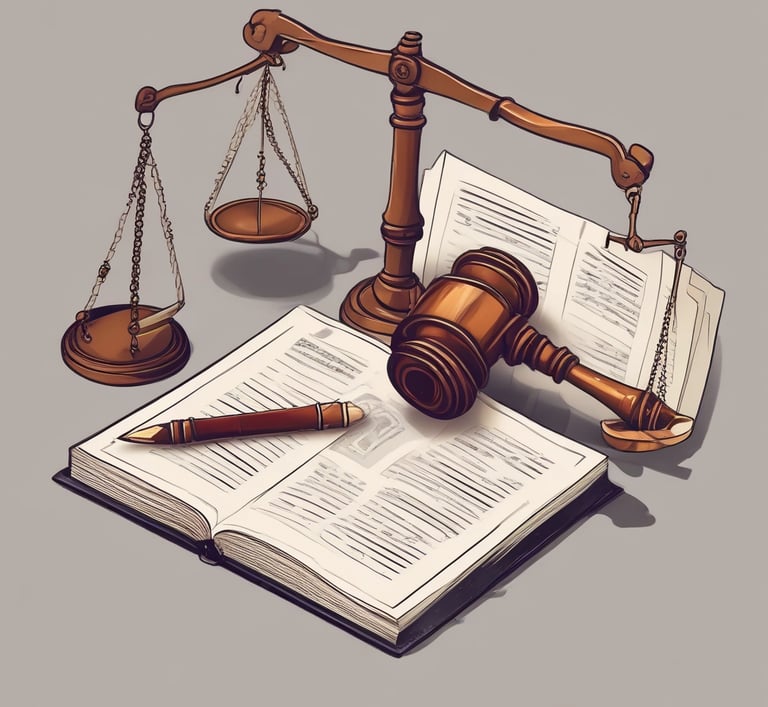Understanding Probate: When is it Legally Necessary?
Mark Leavitt
7/31/20255 min read


What is Probate?
Probate is a legal process that serves a vital role in the administration of a deceased person's estate. When someone passes away, their belongings, debts, and obligations must be managed and distributed in accordance with the law. The primary function of probate is to validate the deceased individual's will, if one exists, ensuring that their final wishes are respected. This process is overseen by a probate court, which has jurisdiction over all matters related to the probate of estates.
Upon initiation of the probate process, the court verifies the authenticity of the will, if presented. This includes confirming that the document reflects the true intentions of the deceased and that it adheres to state laws regarding will creation and execution. In the absence of a valid will, the estate will be settled according to intestacy laws, which dictate how assets are distributed among surviving relatives.
Throughout the probate process, several critical steps must be undertaken. Initially, the personal representative or executor, designated in the will or appointed by the court, is responsible for identifying and marshalling the deceased's assets. This may involve inventorying properties, bank accounts, investments, and personal belongings. Additionally, any outstanding debts, including mortgages, loans, and taxes, need to be addressed before distribution of the remaining assets can occur. The probate court ensures that all creditors are paid, providing a layer of protection for beneficiaries against potential claims on the estate.
Following the resolution of debts and taxes, the final phase of probate involves distributing the remaining assets to heirs or beneficiaries as stipulated in the will or according to intestacy laws. The entire probate process can be complex and lengthy, varying in duration depending on the estate's size, the presence of disputes, and state laws governing probate proceedings. Overall, the probate process plays a crucial role in the orderly administration and closure of a deceased person's estate.
When is Probate Required?
Probate is a legal process that occurs after someone dies to establish the validity of their will and manage their estate. Understanding when probate is required is vital for both executors and beneficiaries. Several factors can trigger the need for probate proceedings, primarily revolving around the type of assets owned by the deceased.
The presence of a will is a crucial determinant in the probate process. If the deceased left a valid will, this document serves as a roadmap for how their assets should be distributed. In such cases, probate is generally necessary to authenticate the will and ensure that the deceased's wishes are honored. Without a will, known as dying intestate, probate becomes essential to determine how the estate will be divided according to state law.
Another significant factor is the total value of the decedent's assets. Many states have established thresholds; if an estate's total value exceeds a certain limit, probate is mandated. Typically, this assessment includes real estate, bank accounts, investments, and personal property. It's important to note that some assets may not require probate if they have designated beneficiaries or are held in trust, which can circumvent the process altogether.
State-specific laws also play a pivotal role in the probate process. Each jurisdiction has its own statutes governing probate, dictating when the process is required and how it should be conducted. For example, some states may offer simplified procedures for small estates, while others maintain formal protocols for larger assets. Understanding local regulations is critical to navigating the probate landscape effectively.
Ultimately, assessing the necessity of probate involves examining the decedent's will, asset types, total value, and the legal framework in place within the state. A clear grasp of these factors is essential for all parties involved in the estate administration process.
When Can Probate be Avoided?
Probate, the legal process of administering a deceased person's estate, is often viewed as a cumbersome requirement. However, there are several circumstances where probate can be avoided, ultimately simplifying the transfer of assets and saving time and money for beneficiaries. Understanding these exceptions is crucial for estate planning.
One of the most common ways to bypass probate is through small estate exemptions. Many states offer a simplified probate procedure for estates that fall below a certain monetary threshold. These thresholds vary by jurisdiction but typically apply to estates with minimal assets, allowing for a faster distribution without the full probate process. This option can be particularly beneficial for individuals with limited estates.
Joint ownership of property is another effective strategy to avoid probate. When assets are co-owned, such as in the case of spouses who hold property as joint tenants with rights of survivorship, ownership automatically transfers to the surviving partner upon death. This means that the asset does not pass through probate, leading to a more streamlined transition and reduced legal fees.
Additionally, creating a living trust is a proactive approach often employed in estate planning. Assets placed in a revocable living trust do not have to go through probate. The trust's designated trustee can manage the assets for the benefit of the beneficiaries without court supervision, thereby expediting the distribution process and maintaining privacy regarding the estate's contents.
Beneficiary designations on financial accounts, such as life insurance policies, retirement accounts, or bank accounts, also allow individuals to directly designate beneficiaries. These accounts pass directly to the named beneficiaries, thus evading probate. By utilizing these strategies, individuals can effectively minimize or eliminate the likelihood of enduring a lengthy probate process, ensuring a smoother transition of their estate to their heirs.
Probate in Northern Colorado
In Northern Colorado, probate is a crucial legal process that often arises upon the death of an individual. The probate laws in this region are governed by Colorado state statutes, which outline how estates are managed, assets distributed, and debts settled. Understanding these local probate regulations is essential for anyone dealing with asset distribution after the demise of a loved one.
The probate process typically begins with the appointment of a personal representative, also known as an executor, who is responsible for handling the decedent's estate. This appointment is conducted through the local probate court, where individuals can submit the deceased’s will for validation. In Northern Colorado, the probate court aims to streamline the evaluation and validation process, which may offer some advantages compared to other jurisdictions.
Timelines involved in the probate process can vary. Generally, simpler estates may be completed more swiftly than those with complex assets or multiple beneficiaries. In Northern Colorado, the average duration for probate can range from a few months to over a year, largely depending on the intricacies of the estate and any potential disputes between heirs. Early engagement with a probate attorney familiar with local laws can facilitate a smoother process and help navigate any unforeseen challenges that may arise.
Additionally, Northern Colorado has unique factors that may influence the probate process. Local cultural traits, such as community involvement in estate settlements, might encourage mediation between parties rather than contentious court procedures. It is also critical for residents to be aware of Colorado's well-defined homestead exemptions and how they could impact asset transfers during probate. Overall, understanding the specifics of probate in Northern Colorado can aid individuals in efficiently managing estate matters, ensuring compliance with local laws while minimizing stress during a challenging time.
